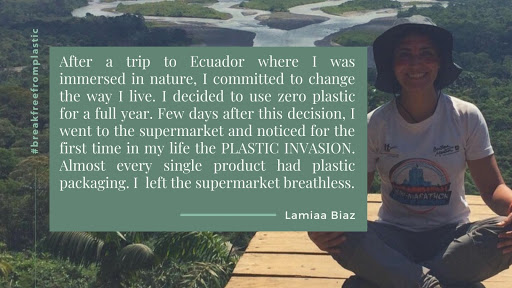For many years, I’ve heard of people doing their ecological transition and never really knew what it meant. Since 2015, I started behaving more responsibly and I was 100% certain I was living in a way that respects Nature. In 2018, I worked on a project to analyse how to influence consumers to behave in a sustainable way. I interviewed an expert on plastic bottle recycling who explained that it is hard for people to imagine how throwing away plastic even in bins can harm the environment because they don’t know where their garbage goes. These people probably don’t realize how their trash ends in oceans and other natural environments, and would probably choose not to litter directly. However, from an ecological point of view, throwing a plastic bottle in the garbage can also have a negative impact on the environment since that bottle might end up being incinerated. I realized I was ignorantly polluting the environment every day. Later, after a trip in Ecuador where I was immersed in Nature, I committed to change the way I live. I decided to use zero plastic for a full year.



Few days after this decision, I returned to France and visited the supermarket and noticed for the first time in my life the PLASTIC INVASION. Almost every single product had plastic packaging: salads, yogurts, cheese, pasta, rice, lentils, tea, liquid soaps, solid soaps, dentifrice, Q-tips, cotton, toilet paper, toothbrush, everything. I left the supermarket breathless. Great, what am I going to do now? I decided to turn my frustration into creativity and find ways to replace those products.

My plastic free journey for a full year
It took me 9 months to figure out how to replace all the food packaged in plastic. Today, 95% of the food I buy does not have any plastic packaging. Consuming plastic-free food has meant buying mostly unprocessed food, and therefore purchasing ingredients and then preparing them myself. Also, I had to change some habits: I started to bring my own receptacle when buying fresh food and to always specify to merchants that I avoid plastic.


When learning about cosmetic plastic-free alternatives, I discovered the do-it-yourself concept and realised that the main motivation of some bloggers was to create natural chemical-free products. Some books convinced me to stop using most cosmetics I used to buy and to look for natural alternatives. Even though chemical-free products do not mean plastic-free packaging, after a year, I managed to decrease by 70% cosmetics packaged in plastic: I eliminated 40% of the products I used to buy, and I replaced 30% by plastic-free alternatives.
Besides goods packaged in plastic, I managed to replace some products made in plastic for long term use when the non-plastic alternative was easy to find and convenient to use (for example, hangers). However, I bought some goods made in plastic for long term use because the alternative was inconvenient or simply did not exist (for example swimming goggles).
Personal thoughts after a year living without plastic
The hard things about my plastic-free journey were:
▪ Greenwashing: brands have very confusing messages. There were so many books, so many blogs and so many contradictory opinions; sorting things out was a full-time job.
▪ Learning process and time needed: to make my own cosmetics, I needed to find a recipe, source ingredients, test the recipe and finally improve my “production process” to get a better product.
▪ Generalisation: replacing a few products was feasible but generalising to all products in a short time frame was difficult.
After a year, living without plastic became effortless. Ever since I have built new habits and learned about the alternatives. My zero plastic project has been an opportunity for me to do my ecological transition and helped me find meaning. It brought me closer to my essence and changed my relationship with time: instead of being a fast consumer, I acquired knowledge and became a “producer” at my own pace. The key for this project was to be open to changing the way I was living and to give up on things I really liked. I did it, because Nature is so important for me. To be able to see change around us, we need to be that change. Don’t just do. Be.
About the Author
Lamiaa is from Morocco and moved to France at 18 years old to study Economics. She worked for 10 years in diverse fields from banking to filmmaking to startups. Today, she is an environmental specialist introducing sustainable innovations to the market. At a more personal level, Lamiaa likes yoga, outdoor sports and travels.
This article is an abridged version written specifically for #breakfreefromplastic. To read Lamiaa’s full journey, read the original article here.




